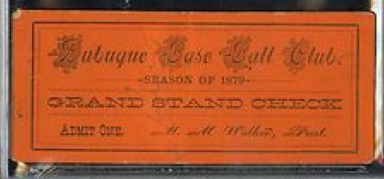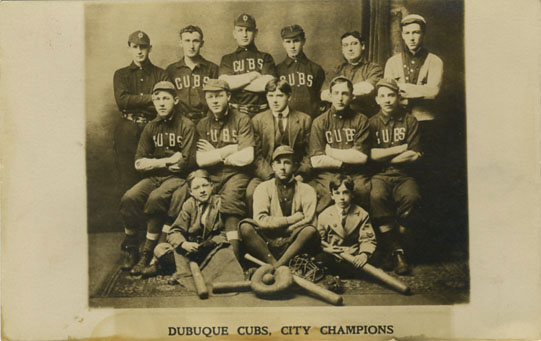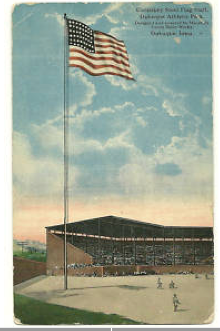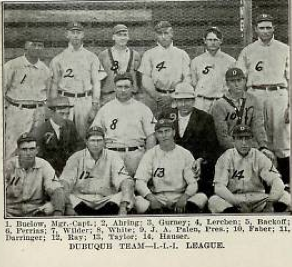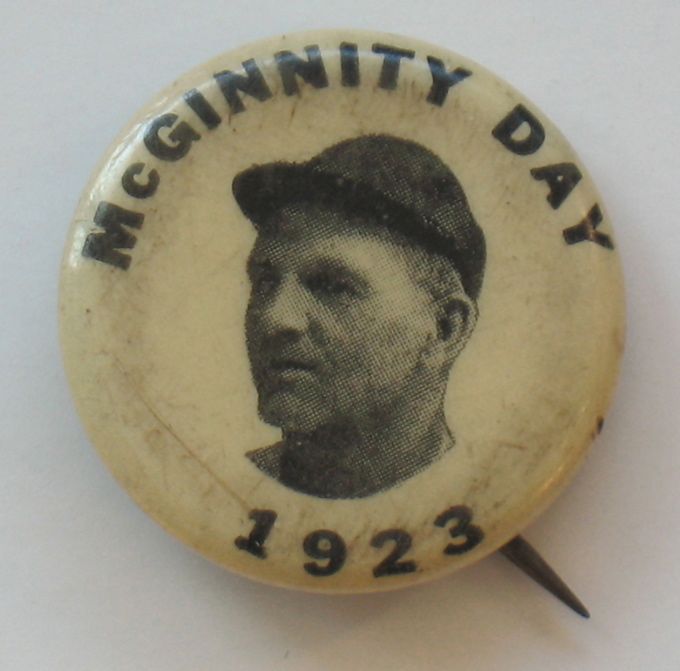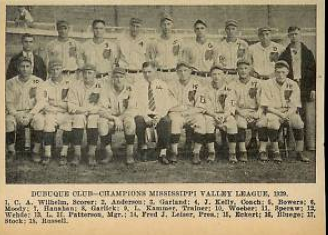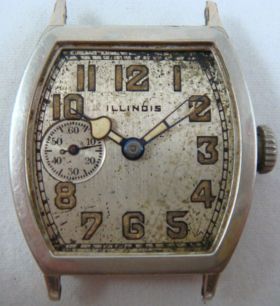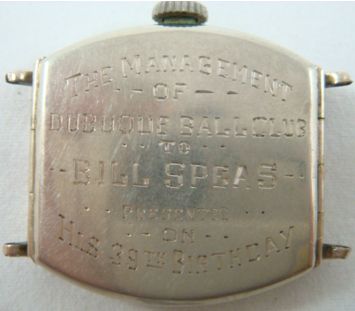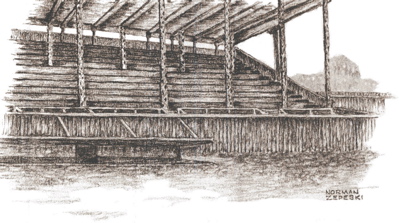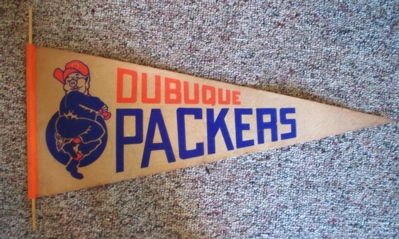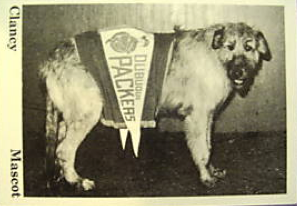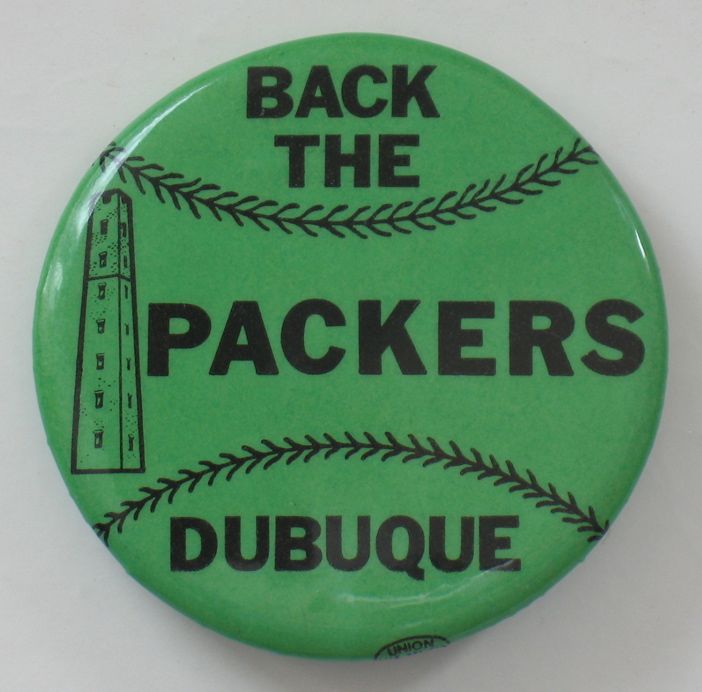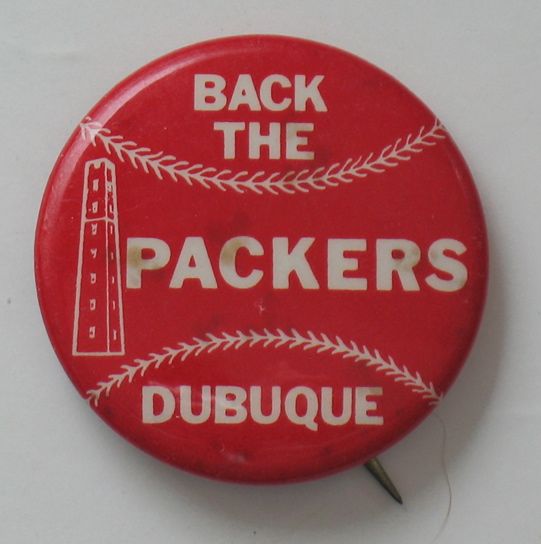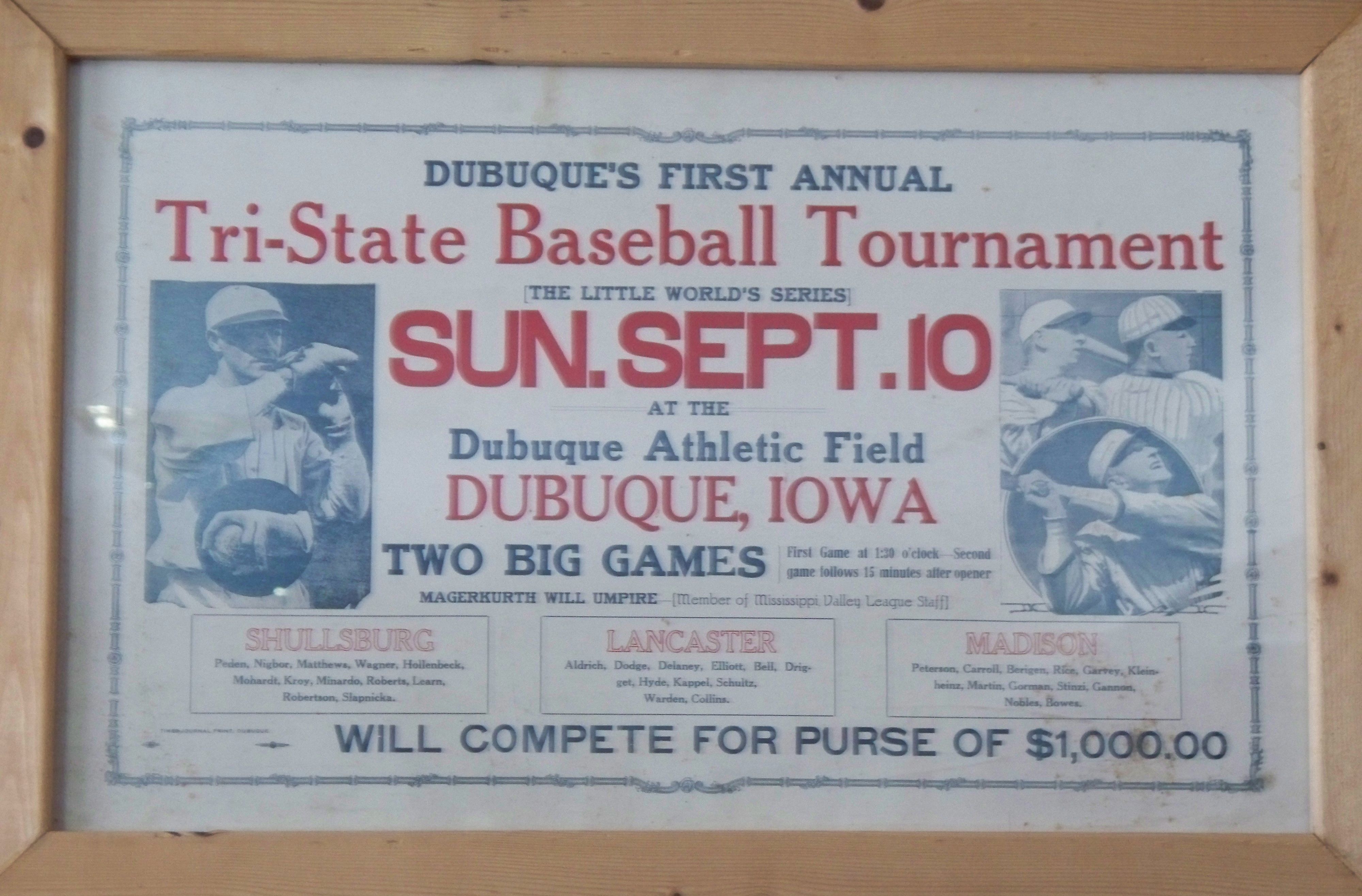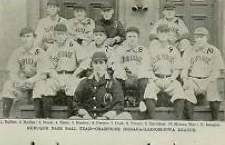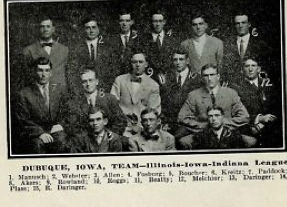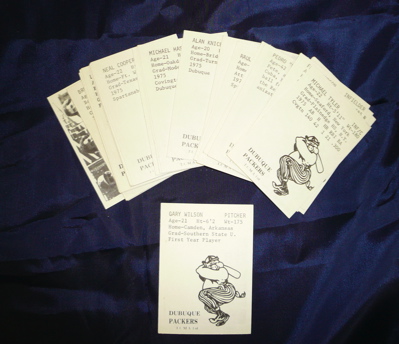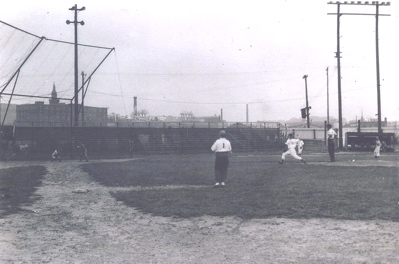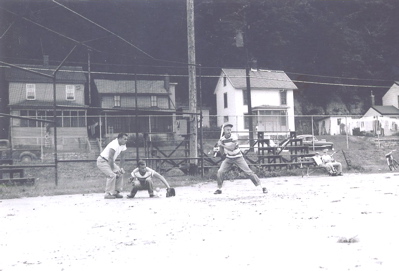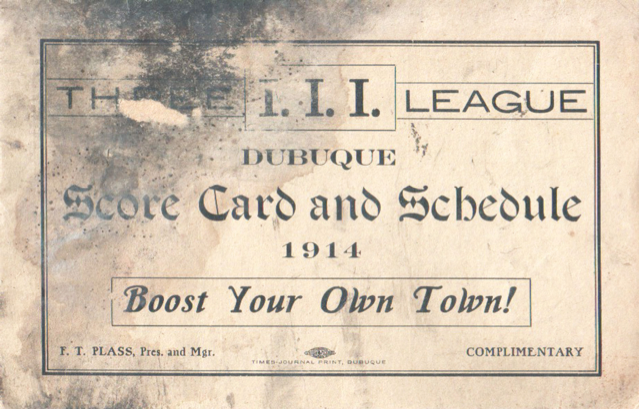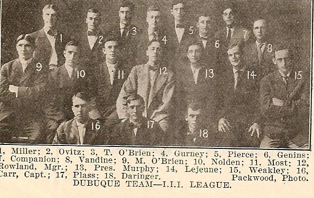Encyclopedia Dubuque
"Encyclopedia Dubuque is the online authority for all things Dubuque, written by the people who know the city best.”
Marshall Cohen—researcher and producer, CNN
Affiliated with the Local History Network of the State Historical Society of Iowa, and the Iowa Museum Association.
BASEBALL: Difference between revisions
No edit summary |
No edit summary |
||
| Line 124: | Line 124: | ||
[[Image:bleachers.jpg|right|thumb|250px|The grandstand at the 4th Street Ball Park. Illustration by Norman Zepeski]] | [[Image:bleachers.jpg|right|thumb|250px|The grandstand at the 4th Street Ball Park. Illustration by Norman Zepeski]] | ||
In 1930 the dream of night baseball came to Dubuque. The [[FOURTH STREET BASEBALL FIELD]], a dream of Leiser, was said to have the best lighting system of its day. It was also the first municipally-owned baseball field in the United States. This was five years before lighted baseball came to the major leagues. The first game was played on July 14, 1930, when the Tigers lost to Moline 13-7 | In 1930 the dream of night baseball came to Dubuque in the hopes of stimulating interest and operating profitably. (14) The [[FOURTH STREET BASEBALL FIELD]], a dream of Leiser, was said to have the best lighting system of its day. It was also the first municipally-owned baseball field in the United States. This was five years before lighted baseball came to the major leagues. The first game was played on July 14, 1930, when the Tigers lost to Moline 13-7. | ||
In September 1931 Leiser, president of the Dubuque baseball club since 1925, announced that he was not planning to direct another baseball team in the city. He was ready to sell the franchise to a Dubuque fan's association if one could be organized and properly financed. There was a deficit of $8,000 in 1931. Although lighting the field was initially popular, interest dropped and total attendance for the season did not reach 15,000. Even some Sunday games did not meet the average week-day crowds in past seasons. (15) | |||
Opening day saw Charles Comiskey II return to Dubuque. The White Sox became the parent club for the team known as the Dubuque Packers. Dubuque, a farm club for the White Sox from 1954 to 1958, was then a member of the CLASS D-Ohio Valley League. This became the Midwest League in 1956 and was designated a CLASS A league in 1963. The team was an affiliate of the Pittsburgh Pirates (1959-1960), Cleveland Indians (1961-1966), Los Angeles Dodgers (1967), Kansas City Royals (1968) and the Houston Astros. ( | Professional baseball returned again in 1954. The Mississippi Valley League changed its name to the Mississippi and Ohio Valley League and Dubuque became a member. Through the efforts of many people including Bill Croker, Don Birkett, and Jake Sloan, the Dubuque Packer baseball team was started in Dubuque. The team name was decided in a contest won by Carole Ann Pins, the daughter of Mr. and Mrs. Arthur Pins. In November, Dubuque Baseball Inc. announced a profit of $1,489.13 at the stockholders' meeting. (16) [[PETRAKIS, John|John PETRAKIS]] promoted the program beginning in 1955, and the city set a minor league attendance record drawing over 100,000 fans to the games. | ||
Opening day saw Charles Comiskey II return to Dubuque. The White Sox became the parent club for the team known as the Dubuque Packers. Dubuque, a farm club for the White Sox from 1954 to 1958, was then a member of the CLASS D-Ohio Valley League. This became the Midwest League in 1956 and was designated a CLASS A league in 1963. The team was an affiliate of the Pittsburgh Pirates (1959-1960), Cleveland Indians (1961-1966), Los Angeles Dodgers (1967), Kansas City Royals (1968) and the Houston Astros. (17) | |||
Between 1954 and 1976, the last year Dubuque played in the Midwest League, the city failed only twice, in 1955 and 1976, to produce a major league player. New York Yankees pitcher Tommy John started with Dubuque in 1961. Rookie of the Year (1963) Gary Peters, of the Chicago White Sox, pitched for Dubuque in 1957. In 1966 Tommie Agee received the same award when he played for the White Sox. Agee played for Dubuque in 1961. Voted to either the American or National League all-star teams during their careers, in addition to Agee, Peters, and John were John Romano (1954 with Dubuque), Gene Alley (1959), Joe Rudi (1965), Steve Blass (1969), and Terry Puhl (1975). [[HOERNER, Joseph|Joe HOERNER]] was one of the first relief pitchers named to the National League all-star team in 1970. | Between 1954 and 1976, the last year Dubuque played in the Midwest League, the city failed only twice, in 1955 and 1976, to produce a major league player. New York Yankees pitcher Tommy John started with Dubuque in 1961. Rookie of the Year (1963) Gary Peters, of the Chicago White Sox, pitched for Dubuque in 1957. In 1966 Tommie Agee received the same award when he played for the White Sox. Agee played for Dubuque in 1961. Voted to either the American or National League all-star teams during their careers, in addition to Agee, Peters, and John were John Romano (1954 with Dubuque), Gene Alley (1959), Joe Rudi (1965), Steve Blass (1969), and Terry Puhl (1975). [[HOERNER, Joseph|Joe HOERNER]] was one of the first relief pitchers named to the National League all-star team in 1970. | ||
| Line 137: | Line 139: | ||
[[Image:clancy.png|left|thumb|200px|Clancy, the mascot of the Dubuque Packers]]In 1955 [[PETRAKIS, John|John PETRAKIS]] took charge of baseball in Dubuque. Attendance that year reached 100,000, in fifty-eight dates, or one-quarter of the total attendance in the Midwest League. While most teams at the time were operating in debt, the Dubuque Packers made $11,400. | [[Image:clancy.png|left|thumb|200px|Clancy, the mascot of the Dubuque Packers]]In 1955 [[PETRAKIS, John|John PETRAKIS]] took charge of baseball in Dubuque. Attendance that year reached 100,000, in fifty-eight dates, or one-quarter of the total attendance in the Midwest League. While most teams at the time were operating in debt, the Dubuque Packers made $11,400. | ||
By 1959 the baseball field was in poor condition. The city council had gone on record as offering $20,000 for additional improvements to the Fourth Street park if the public rejected building a new one. The $20,000 brought the amount to keep the field operating since 1950 to more than $75,000. It was estimated that a new field would cost around $250,000. After the 1958 season the Chicago White Sox had left Dubuque over the issue of the park conditions. The Pirates agreed to come to Dubuque if the park was be remodeled. Bill Turner, representing the Pirates, was quoted as saying,"The general feeling is that there are only two or three parks in organized baseball as poor as this one." ( | By 1959 the baseball field was in poor condition. The city council had gone on record as offering $20,000 for additional improvements to the Fourth Street park if the public rejected building a new one. The $20,000 brought the amount to keep the field operating since 1950 to more than $75,000. It was estimated that a new field would cost around $250,000. After the 1958 season the Chicago White Sox had left Dubuque over the issue of the park conditions. The Pirates agreed to come to Dubuque if the park was be remodeled. Bill Turner, representing the Pirates, was quoted as saying,"The general feeling is that there are only two or three parks in organized baseball as poor as this one." (18) | ||
In November 3, 1959 Dubuque voters were asked to participate in a straw poll. Although the results had no legal status, the question placed before the public was whether the city should hold an election for a bond issue for the purpose of constructing a new baseball park. ( | In November 3, 1959 Dubuque voters were asked to participate in a straw poll. Although the results had no legal status, the question placed before the public was whether the city should hold an election for a bond issue for the purpose of constructing a new baseball park. (19) | ||
On August 7, 1962, Dubuque took over the failing Keokuk franchise. When Petrakis offered to operate the club in Dubuque, Dubuque joined Los Angeles, Philadelphia, Chicago, and New York having two professional teams-the Packers and the Midwest Dodgers. At the end of that year, Dubuque became the only city to have two doubleheaders with four teams playing the same day. | On August 7, 1962, Dubuque took over the failing Keokuk franchise. When Petrakis offered to operate the club in Dubuque, Dubuque joined Los Angeles, Philadelphia, Chicago, and New York having two professional teams-the Packers and the Midwest Dodgers. At the end of that year, Dubuque became the only city to have two doubleheaders with four teams playing the same day. | ||
| Line 149: | Line 151: | ||
Professional baseball left Dubuque after the 1976 season. The Astros moved their primary Class A affiliate to the Florida State League. In 1967 Municipal Stadium was renamed Petrakis Park after the longtime baseball promoter. | Professional baseball left Dubuque after the 1976 season. The Astros moved their primary Class A affiliate to the Florida State League. In 1967 Municipal Stadium was renamed Petrakis Park after the longtime baseball promoter. | ||
During the 1994-1996 seasons, the Dubuque Mud Puppies played in the [[NORTHWOODS LEAGUE]], a summer "wooden bat circuit for college underclassmen. Jeff Weaver, a pitcher for Dubuque, became the first player to reach the Major Leagues and won the deciding game as a St. Louis Cardinal in the 2006 World Series. ( | During the 1994-1996 seasons, the Dubuque Mud Puppies played in the [[NORTHWOODS LEAGUE]], a summer "wooden bat circuit for college underclassmen. Jeff Weaver, a pitcher for Dubuque, became the first player to reach the Major Leagues and won the deciding game as a St. Louis Cardinal in the 2006 World Series. (20) | ||
In 2003 Michael Gartner, chairman and co-owner of the Triple-A Iowa Cubs, with partners Sam Bernabe and Michael Giudicessi planned to move their Midwest League team from Battle Creek, Michigan to Dubuque. The owners had planned to use their long-term relationship with the the Chicago Cubs to sign a player development contract. Dubuque residents, however, did not agree with the financing of the project. By a nearly two-thirds majority they rejected a $6 million bond issue that would have contributed to the $15 million needed to construct a 4,000-seat ballpark at the Port of Dubuque. Following the bond issue vote, the investors sold the team. ( | In 2003 Michael Gartner, chairman and co-owner of the Triple-A Iowa Cubs, with partners Sam Bernabe and Michael Giudicessi planned to move their Midwest League team from Battle Creek, Michigan to Dubuque. The owners had planned to use their long-term relationship with the the Chicago Cubs to sign a player development contract. Dubuque residents, however, did not agree with the financing of the project. By a nearly two-thirds majority they rejected a $6 million bond issue that would have contributed to the $15 million needed to construct a 4,000-seat ballpark at the Port of Dubuque. Following the bond issue vote, the investors sold the team. (21) | ||
In 2007 Joe Chlapaty, a person instrumental in financing growth at the [[UNIVERSITY OF DUBUQUE]], investigated the possibility of bringing a team to Dubuque. He found that purchasing a team was not a problem. He presented stadium proposals to city officials but finding a franchise within the Midwest League and obtaining the league's approval to move it to Dubuque was a major issue. Determining the ownership of the teams was difficult. Many were community-owned. ( | In 2007 Joe Chlapaty, a person instrumental in financing growth at the [[UNIVERSITY OF DUBUQUE]], investigated the possibility of bringing a team to Dubuque. He found that purchasing a team was not a problem. He presented stadium proposals to city officials but finding a franchise within the Midwest League and obtaining the league's approval to move it to Dubuque was a major issue. Determining the ownership of the teams was difficult. Many were community-owned. (22) | ||
Although major league teams move their affiliates around, host cities tend to remain the same. Major league clubs then sign two-to-three year player development contracts with the city. The Midwest League has sixteen teams all affiliated with big league teams. As the player development contracts expire, affiliates look around for new locations between mid-August and late September. Rules do not allow talks between potential host cities and affiliates outside this short period. Teams are guaranteed an affiliation, but matches may not always be between interested parties. ( | Although major league teams move their affiliates around, host cities tend to remain the same. Major league clubs then sign two-to-three year player development contracts with the city. The Midwest League has sixteen teams all affiliated with big league teams. As the player development contracts expire, affiliates look around for new locations between mid-August and late September. Rules do not allow talks between potential host cities and affiliates outside this short period. Teams are guaranteed an affiliation, but matches may not always be between interested parties. (23) | ||
If a team could be obtained, Dubuque could be ready for baseball in about two years according to City Manager [[VAN MILLIGEN, Michael|Michael VAN MILLIGEN]]. The Port of Dubuque property that was mentioned in the 2003 referendum was still available in 2014. The former site of [[DUBUQUE PACKING COMPANY]] was also a possibility. The cost of purchasing a team and the need for significant city funding have made the likelihood of Dubuque moving ahead with minor league baseball beyond 2014 look remote. ( | If a team could be obtained, Dubuque could be ready for baseball in about two years according to City Manager [[VAN MILLIGEN, Michael|Michael VAN MILLIGEN]]. The Port of Dubuque property that was mentioned in the 2003 referendum was still available in 2014. The former site of [[DUBUQUE PACKING COMPANY]] was also a possibility. The cost of purchasing a team and the need for significant city funding have made the likelihood of Dubuque moving ahead with minor league baseball beyond 2014 look remote. (24) | ||
[[Image:tristatebaseball.jpg|left|thumb|250px|Photo courtesy: Bob Reding]] | [[Image:tristatebaseball.jpg|left|thumb|250px|Photo courtesy: Bob Reding]] | ||
| Line 203: | Line 205: | ||
14. "Dubuque Will Keep Franchise," | 14. "Dubuque Will Keep Franchise," | ||
15. Leitner. | 15. "Fans Must Act in Two Weeks to Keep Club," ''Telegraph Herald'', September 13, 1931 | ||
16. Ibid. | |||
17. Leitner. | |||
18. "Ball Park Problems to Go to Voters," ''Telegraph Herald'', November 1, 1959, p. 1 | |||
19. Ibid. | |||
20. Leitner. | |||
21. Leitner, Jim. "A Rare Opportunity," ''Telegraph Herald'', August 24, 2014, p. 1C | |||
22. Piper, Andy. "Business of Baseball," ''Telegraph Herald'', August 25, 2014, p. 1B | |||
23. Piper, Andy. "Small-Market Stars," ''Telegraph Herald'', August 26, 2014, p. 3B | |||
24. Piper. "Business of Baseball," p. 3B | |||
http://www.tradingcarddb.com/ViewAllSet.cfm/sid/76914/1976-TCMA-Dubuque-Packers | http://www.tradingcarddb.com/ViewAllSet.cfm/sid/76914/1976-TCMA-Dubuque-Packers | ||
Revision as of 04:24, 15 April 2015
Documentary: https://www.youtube.com/watch?v=kl6lukHHApc
Year League Team
1974-76 Midwest League DUBUQUE PACKERS (1)
1968 Midwest League DUBUQUE ROYALS (2)
August,1962 Midwest League MIDWEST DODGERS (3)
1954-1961 Midwest League Dubuque Packers
1954-1955 Mississippi-Ohio Valley League Dubuque Packers
1929-1932 Mississippi Valley League DUBUQUE TIGERS
1927-1928 Mississippi Valley League DUBUQUE DUBS
1926 Mississippi Valley League DUBUQUE SPEASMEN
1925 Mississippi Valley League DUBUQUE IRONMEN
1924 Mississippi Valley League Dubuque Dubs
1922-1923 Mississippi Valley League DUBUQUE CLIMBERS
1917 Central Association Dubuque Dubs
1912-1914 Illinois-Indiana-Iowa League Dubuque Dubs
1911 Illinois-Indiana-Iowa League DUBUQUE HUSTLERS
1906-1910 Illinois-Indiana-Iowa League Dubuque Dubs
1903-1905 Illinois-Indiana-Iowa League DUBUQUE SHAMROCKS
1899 Western League Dubuque
1895 Eastern Iowa League Dubuque
1888-1890 Central Interstate League Dubuque
1879 Northwest League Dubuque
Affiliations (4)
Chicago White Sox, 1954-58
Pittsburgh Pirates, 1959-60
Cleveland Indians, 1961-66
Los Angeles Dodgers, 1967
Kansas City Royals, 1968
While technically a Royals farm, this was staffed
as a cooperative team with at least 15 teams contributing players.
Cooperative, 1974
Houston Astros, 1975-76
Attendance record---97,220 (1959) (5)
BASEBALL. The first full nine-inning game with nine players on each side was played by the two teams of the Julien Baseball Club of Dubuque in the summer of 1865. Called at the time "the best game ever played in the city," the winning side made twelve fly catches, the losing side made nine, and the score was 21 to 12. In late September, the Empire team from St. Louis defeated the Juliens 35 to 29. In 1866 the Dubuque team played in a baseball tournament at Rockford, Illinois.
Organized baseball, at least the team had a manager and played against other towns, debuted in Dubuque in 1866. In that year, there were only four organized teams in the west. These included the Cream Cities of Milwaukee, Wisconsin; Unions of Chicago, Illinois; Forest City of Rockford, Illinois, and the Excelsiors of Dubuque. (6) Baseball players in those days did not wear gloves, masks, or chest protectors. The bare-handed catcher stood far enough behind the batter to catch the ball on the first bounce. One of the rules was that a foul caught on the first bounce by the catcher was an "out." (7)
The Excelsior team that made history was first called the Dubuque Clipper Club in 1867. Led by Al Clark, the Clipper Club defeated the Excelsiors for the territory championship in 1868 and then changed their name to the Excelsior Juniors and later the Excelsiors. The team played everyone and defeated the Omaha, Nebraska team twice. This led to a famous "switch." Omaha challenged the Excelsiors again. It was several days before the game that the Dubuque fans found out that Omaha had purchased the services of another club. This "hiring a battery" was not uncommon, but the Dubuque fans rightly feared a loss. It was to their surprise that on game day they found the Excelsior manager had hired a St. Paul, Minnesota "battery." This happened to be one of the finest in the game at the time and led "Dubuque" to a 2-1 victory. (8)
During the 1870s Dubuque was one of the first cities in the United States to support professional baseball. In its history, Dubuque played under six different banners: Northwestern League, Three-I, Central Association, Mississippi Valley, Mississippi and Ohio Valley (MOV) and Midwest. Ted Sullivan started an independent team in 1878 and helped organize the Northwest League, the first professional baseball league west of the MISSISSIPPI RIVER, which included Rockford, Illinois; Omaha, Nebraska; Davenport and Dubuque, Iowa. He was a leader in signing quality players including the famous Charles COMISKEY.
In 1879 Dubuque became a charter member of the Northwest League, the first professional baseball league in Iowa. The league consisted of Dubuque, Omaha, Davenport, and Rockford. Dubuque won the league pennant that year. (9) It went on to defeat Providence and the Chicago Cubs, the top two teams in the National League. The 1-0 win over the Cubs led Dubuque, with such talent as Comiskey and Charles RADBOURNE, to claim the world championship. The team remained in Dubuque only three seasons and played on what became COMISKEY PARK. (10)
Dubuque's life in the Northwest League was short, and until 1888 it was out of professional baseball. During these years the city was represented by a traveling team that played in Duluth, Minnesota; Eau Claire, Wisconsin; and Rockford, Illinois.
From 1888 to 1890 Dubuque joined the Interstate League. Dubuque then entered the Iowa-Illinois circuit, and games were played at NUTWOOD PARK. The team moved into the new Twenty Fourth Street Park (now Comiskey Park) in 1895, the year it joined the Eastern Iowa League. Dubuque compiled a 28-5 record before the Iowa Illinois League disbanded. Playing as an independent team, Dubuque won thirty of its next thirty-four games.
Financial concerns in which "Ted Sullivan's management left the team in the hole" led to Manager Hodge seeking subscriptions to support the team in 1898.
He has called on quite a number and only in
one or two instances did he meet with a
refusal to subscribe. In these instances
he was not only refused but given a tongue-
lashing...It is hoped the generous people of
Dubuque will continue to subscribe... (11)
In 1899 Dubuque joined the Western Association that included Burlington, Denver, Des Moines, Dubuque, Lincoln, Peoria, Quincy, Rockford, Springfield, and St. Joseph. Harry Raymond served as the club's manager and played third base barehanded.
In 1903 Dubuque appeared in the Three-I League when Comiskey convinced Clarence (Pants) Rowland to leave his pool hall business and manage the Dubuque team. Pitching for Dubuque from 1909 to 1910 was Urban "Red" FABER. Dubuque remained in the Three-I League through 1914 before dropping out.
In 1910 financial concerns faced the local team. On July 21, 1910 stockholders of the Dubuque Base Ball and Amusement Association decided to retain the franchise and to sell the remaining stock of the company. At the time, only about $1,000 of debt could be easily handled. The park valued at $15,000 was without debt. There was, however, no money to pay the team while it was away. The problem would be resolved when the players returned to Dubuque to play a series at home. (12)
In 1914 the team played on the DUBUQUE ATHLETIC FIELD, a new ballpark donated to the city by Fred LEISER.
There was the chance to sell the franchise to Quincy and make a good profit. This was not seriously considered. Rather than ask for money, the decision was made to sell the stock, worth $3,500. The stock to be sold was on the team, franchise, and all real estate owned by the company. A committee was chosen to meet with businessmen who might purchase shares. An effort was also planned to increase attendance. "Unless the attendance improves, the outlook looks doubtful." (13)
In 1922 Dubuque returned to professional baseball as part of the Mississippi Valley League. Comiskey again helped out by finding another manager. Joe MCGINNITY had a record of 247 victories in ten seasons with Baltimore, Brooklyn and the New York Giants when he came to Dubuque. In 1923, the year he arrived, Dubuque won its first pennant.
Baseball in the 1920s meant night games and better-known players. In 1923 McGinnity, part owner and player-manager of the team, led Dubuque to the Mississippi Valley championship while pitching in 206 innings and winning fifteen games for his Dubuque club.
Dubuque won another pennant in 1927 while managed by John William SPEAS, Sr. A third pennant from the Mississippi Valley League was won in 1929 when the team was managed by Pat Patterson.
In 1930 the dream of night baseball came to Dubuque in the hopes of stimulating interest and operating profitably. (14) The FOURTH STREET BASEBALL FIELD, a dream of Leiser, was said to have the best lighting system of its day. It was also the first municipally-owned baseball field in the United States. This was five years before lighted baseball came to the major leagues. The first game was played on July 14, 1930, when the Tigers lost to Moline 13-7.
In September 1931 Leiser, president of the Dubuque baseball club since 1925, announced that he was not planning to direct another baseball team in the city. He was ready to sell the franchise to a Dubuque fan's association if one could be organized and properly financed. There was a deficit of $8,000 in 1931. Although lighting the field was initially popular, interest dropped and total attendance for the season did not reach 15,000. Even some Sunday games did not meet the average week-day crowds in past seasons. (15)
Professional baseball returned again in 1954. The Mississippi Valley League changed its name to the Mississippi and Ohio Valley League and Dubuque became a member. Through the efforts of many people including Bill Croker, Don Birkett, and Jake Sloan, the Dubuque Packer baseball team was started in Dubuque. The team name was decided in a contest won by Carole Ann Pins, the daughter of Mr. and Mrs. Arthur Pins. In November, Dubuque Baseball Inc. announced a profit of $1,489.13 at the stockholders' meeting. (16) John PETRAKIS promoted the program beginning in 1955, and the city set a minor league attendance record drawing over 100,000 fans to the games.
Opening day saw Charles Comiskey II return to Dubuque. The White Sox became the parent club for the team known as the Dubuque Packers. Dubuque, a farm club for the White Sox from 1954 to 1958, was then a member of the CLASS D-Ohio Valley League. This became the Midwest League in 1956 and was designated a CLASS A league in 1963. The team was an affiliate of the Pittsburgh Pirates (1959-1960), Cleveland Indians (1961-1966), Los Angeles Dodgers (1967), Kansas City Royals (1968) and the Houston Astros. (17)
Between 1954 and 1976, the last year Dubuque played in the Midwest League, the city failed only twice, in 1955 and 1976, to produce a major league player. New York Yankees pitcher Tommy John started with Dubuque in 1961. Rookie of the Year (1963) Gary Peters, of the Chicago White Sox, pitched for Dubuque in 1957. In 1966 Tommie Agee received the same award when he played for the White Sox. Agee played for Dubuque in 1961. Voted to either the American or National League all-star teams during their careers, in addition to Agee, Peters, and John were John Romano (1954 with Dubuque), Gene Alley (1959), Joe Rudi (1965), Steve Blass (1969), and Terry Puhl (1975). Joe HOERNER was one of the first relief pitchers named to the National League all-star team in 1970.
Fans of professional baseball in Dubuque have remained loyal. A Packer Pals Club was organized in 1955 by loyal female fans. A Packer Backers organization was formed in an attempt to keep professional baseball in Dubuque.
In 1955 John PETRAKIS took charge of baseball in Dubuque. Attendance that year reached 100,000, in fifty-eight dates, or one-quarter of the total attendance in the Midwest League. While most teams at the time were operating in debt, the Dubuque Packers made $11,400.
By 1959 the baseball field was in poor condition. The city council had gone on record as offering $20,000 for additional improvements to the Fourth Street park if the public rejected building a new one. The $20,000 brought the amount to keep the field operating since 1950 to more than $75,000. It was estimated that a new field would cost around $250,000. After the 1958 season the Chicago White Sox had left Dubuque over the issue of the park conditions. The Pirates agreed to come to Dubuque if the park was be remodeled. Bill Turner, representing the Pirates, was quoted as saying,"The general feeling is that there are only two or three parks in organized baseball as poor as this one." (18)
In November 3, 1959 Dubuque voters were asked to participate in a straw poll. Although the results had no legal status, the question placed before the public was whether the city should hold an election for a bond issue for the purpose of constructing a new baseball park. (19)
On August 7, 1962, Dubuque took over the failing Keokuk franchise. When Petrakis offered to operate the club in Dubuque, Dubuque joined Los Angeles, Philadelphia, Chicago, and New York having two professional teams-the Packers and the Midwest Dodgers. At the end of that year, Dubuque became the only city to have two doubleheaders with four teams playing the same day.
In 1969 Dubuque again slipped out of the professional leagues but returned to re-enter the Midwest League in 1974 with teams that played in the 1974, 1975, and 1976 seasons.
Professional baseball left Dubuque after the 1976 season. The Astros moved their primary Class A affiliate to the Florida State League. In 1967 Municipal Stadium was renamed Petrakis Park after the longtime baseball promoter.
During the 1994-1996 seasons, the Dubuque Mud Puppies played in the NORTHWOODS LEAGUE, a summer "wooden bat circuit for college underclassmen. Jeff Weaver, a pitcher for Dubuque, became the first player to reach the Major Leagues and won the deciding game as a St. Louis Cardinal in the 2006 World Series. (20)
In 2003 Michael Gartner, chairman and co-owner of the Triple-A Iowa Cubs, with partners Sam Bernabe and Michael Giudicessi planned to move their Midwest League team from Battle Creek, Michigan to Dubuque. The owners had planned to use their long-term relationship with the the Chicago Cubs to sign a player development contract. Dubuque residents, however, did not agree with the financing of the project. By a nearly two-thirds majority they rejected a $6 million bond issue that would have contributed to the $15 million needed to construct a 4,000-seat ballpark at the Port of Dubuque. Following the bond issue vote, the investors sold the team. (21)
In 2007 Joe Chlapaty, a person instrumental in financing growth at the UNIVERSITY OF DUBUQUE, investigated the possibility of bringing a team to Dubuque. He found that purchasing a team was not a problem. He presented stadium proposals to city officials but finding a franchise within the Midwest League and obtaining the league's approval to move it to Dubuque was a major issue. Determining the ownership of the teams was difficult. Many were community-owned. (22)
Although major league teams move their affiliates around, host cities tend to remain the same. Major league clubs then sign two-to-three year player development contracts with the city. The Midwest League has sixteen teams all affiliated with big league teams. As the player development contracts expire, affiliates look around for new locations between mid-August and late September. Rules do not allow talks between potential host cities and affiliates outside this short period. Teams are guaranteed an affiliation, but matches may not always be between interested parties. (23)
If a team could be obtained, Dubuque could be ready for baseball in about two years according to City Manager Michael VAN MILLIGEN. The Port of Dubuque property that was mentioned in the 2003 referendum was still available in 2014. The former site of DUBUQUE PACKING COMPANY was also a possibility. The cost of purchasing a team and the need for significant city funding have made the likelihood of Dubuque moving ahead with minor league baseball beyond 2014 look remote. (24)
---
Source:
1. MWLguide.com "Baseball in Dubuque, Iowa." Online: http://www.mwlguide.com/cities/dubuque/
2. Ibid.
3. Ibid.
4. Ibid.
5. Ibid.
6. Mullins, Gene. "Baseball in Dubuque Shy 9 Years of Century Mark," Telegraph Herald, September 15, 1946, p. B4
7. Ibid.
8. Ibid.
9. Leitner, Jim. "Rich History in Dubuque," Telegraph Herald, June 24, 2014, p. 2C
10. Ibid.
11. "Are Subscribing," Evening Globe-Journal, June 25, 1898, p. 7
12. "Dubuque Will Keep Franchise," Telegraph Herald, July 22, 1910, p. 78
13. "Dubuque Baseball Shows Profit," Telegraph Herald, November 4, 1954, p. 14
14. "Dubuque Will Keep Franchise,"
15. "Fans Must Act in Two Weeks to Keep Club," Telegraph Herald, September 13, 1931
16. Ibid.
17. Leitner.
18. "Ball Park Problems to Go to Voters," Telegraph Herald, November 1, 1959, p. 1
19. Ibid.
20. Leitner.
21. Leitner, Jim. "A Rare Opportunity," Telegraph Herald, August 24, 2014, p. 1C
22. Piper, Andy. "Business of Baseball," Telegraph Herald, August 25, 2014, p. 1B
23. Piper, Andy. "Small-Market Stars," Telegraph Herald, August 26, 2014, p. 3B
24. Piper. "Business of Baseball," p. 3B
http://www.tradingcarddb.com/ViewAllSet.cfm/sid/76914/1976-TCMA-Dubuque-Packers
"175 Years" Vol. II Telegraph Herald, p. 99
Ray Grant
Riley, Carl V. "7th Inning Stretch," Dubuque Folklore, American Trust and Savings Bank, 1980, p. 99-103
Hank Wernke




